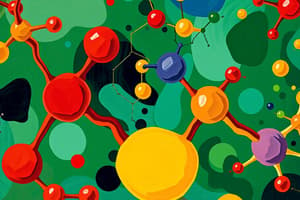Podcast
Questions and Answers
What is the monomer of carbohydrates?
What is the monomer of carbohydrates?
- Cellulose
- Glucose
- Starch
- Monosaccharides (correct)
What carbohydrate serves as energy for cells?
What carbohydrate serves as energy for cells?
Glucose
What carbohydrates are primarily used for energy storage?
What carbohydrates are primarily used for energy storage?
Starch and glycogen
What carbohydrate provides support to plant cells?
What carbohydrate provides support to plant cells?
What components are found in lipids?
What components are found in lipids?
What are the monomers of lipids?
What are the monomers of lipids?
What are the main forms of energy storage in lipids?
What are the main forms of energy storage in lipids?
What type of lipids are crucial for cell membrane structure?
What type of lipids are crucial for cell membrane structure?
What hormones are classified as lipids?
What hormones are classified as lipids?
What are the components of proteins?
What are the components of proteins?
What type of protein acts as enzymes?
What type of protein acts as enzymes?
What proteins provide structural support?
What proteins provide structural support?
What proteins aid in movement?
What proteins aid in movement?
What protein is responsible for transport?
What protein is responsible for transport?
What proteins are involved in communication?
What proteins are involved in communication?
What proteins are key to immunity?
What proteins are key to immunity?
What protein is involved in storage?
What protein is involved in storage?
What protein receives signals?
What protein receives signals?
What are the components of nucleic acids?
What are the components of nucleic acids?
What is the monomer of nucleic acids?
What is the monomer of nucleic acids?
What nucleic acid is associated with heredity?
What nucleic acid is associated with heredity?
What are nucleic acids known as information molecules?
What are nucleic acids known as information molecules?
What is a characteristic of carbohydrates?
What is a characteristic of carbohydrates?
Flashcards are hidden until you start studying
Study Notes
Molecule Classes and Their Components
- Monosaccharides are the monomers that make up carbohydrates.
- Glucose serves as the primary energy source for cells and a raw material for metabolic processes.
- Starch and glycogen act as forms of energy storage in plants and animals, respectively.
- Cellulose provides structural support in plant cells, contributing to their rigidity and strength.
Lipids
- Composed of glycerol and fatty acids, lipids do not form polymers.
- Components of fat molecules consist of glycerol and fatty acids, essential for energy storage.
- Fats and oils serve as energy storage within organisms.
- Phospholipids form a critical component of cell membranes, creating a bilayer essential for cellular structure.
- Steroids, such as testosterone, function as hormones in various biological processes.
Proteins
- Proteins are composed of an amine group, acid group, and a variable R-group that determines their unique properties.
- The monomers of proteins are amino acids, which link to form polypeptides.
- Lactase, an enzyme, catalyzes the breakdown of lactose, showcasing protein function in biochemical reactions.
- Structural proteins include hair and tendons, providing support and shape to cells and tissues.
- Muscle proteins are crucial for movement, allowing for muscular contraction and mobility.
- Hemoglobin functions as a transport protein, carrying oxygen in the blood.
- Signal proteins facilitate communication between cells, playing a crucial role in cellular signaling.
- Antibodies serve as proteins involved in the immune response, identifying and neutralizing pathogens.
- Egg albumin is a storage protein providing nutrients during the development of embryos.
- Receptor proteins are involved in receiving signals from outside the cell, triggering specific responses.
Nucleic Acids
- Composed of a phosphate group, sugar, and nitrogen base, nucleic acids include DNA and RNA.
- Nucleotides are the monomers that link to form nucleic acids, essential for genetic information.
- DNA is the molecule of heredity, carrying genetic instructions used in growth, development, functioning, and reproduction.
- Both DNA and RNA act as important information molecules, vital for protein synthesis and genetic encoding.
- Carbohydrates contain an equal number of carbon and oxygen atoms, an essential characteristic that distinguishes them from other macromolecules.
Studying That Suits You
Use AI to generate personalized quizzes and flashcards to suit your learning preferences.




